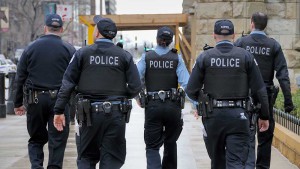Should Police Officers Be a Protected Class Under the Law?
Should police officers be given special protection under hate crime law? Louisiana thinks they should–on May 26th, Governor John Bel Edwards signed the so-called “Blue Lives Matter” bill into law. This legislation makes Louisiana the first state in the nation where police officers (along with firefighters and other first responders) are considered a protected class under the law.
The passing of “Blue Lives Matter” raises several important questions. First, what does it mean if a class of people are “protected” under the law? Also, what are the possible consequences of the passage of the “Blue Lives Matter” legislation?
What Does It Mean to be a Protected Class under the Law?
The landmark Civil Rights Act of 1964 laid the foundation for future anti-discrimination laws and defined the first protected classes. Under the Civil Rights Act, it became illegal to discriminate against people based on their race, color, religion, sex, national or ethnic origin. Before the passage of the Civil Rights Act, schools as well as workplaces were legally segregated along racial lines. 
The subsequent Civil Rights Act of 1968 prohibits physical violence or intimidation towards those in protected classes. Federally protected activities include attending school, patronizing a public place, applying for employment, acting as a juror in a state court or voting. Penalties for violating this law with crimes resulting in bodily injury include up to 10 years in prison. Such crimes involving kidnapping, sexual assault, or murder can be punished by life in prison or the death penalty.
Federal hate crimes can also be prosecuted under the Matthew Shepard and James Byrd, Jr., Hate Crimes Prevention Act of 2009. This legislation expanded federal hate crime law to include protections for sexual orientation and gender identity. Also, unlike in 18 U.S.C. § 245 (b) (2), victims are not required to be engaged in a federally protected activity at the time of their crime.
What about State Hate Crime Laws?
Currently, 45 states and the District of Columbia have laws against hate crimes.
Louisiana is one of the states with anti-hate crime statutes. Louisiana makes it unlawful to victimize someone through crimes including “first or second degree murder, manslaughter and sexual battery” because of their “…actual or perceived race, gender, religion, color, creed, disability, sexual orientation, national origin.”
Even before the Blue Lives Matter bill passed, police officers could be seen as a kind of protected class in Louisiana, as it is one 37 states with enhanced penalties for assaulting a police officer.
Is the Blue Lives Matter Legislation Even Necessary?
Those in favor of Blue Lives Matter say that the law is essential because of what they perceive as increased hostility towards law enforcement. After all, Blue Lives Matter was named in response to Black Lives Matter, the activist group that has protested the deaths of young, unarmed African Americans at the hands of white police officers.
However, according to Seth Stoughton, an assistant law professor at the University of North Carolina, the perception that more officers are being murdered in the line of duty than ever before is actually false.
Stoughton says that instead of a steady uptick in officer killings in recent years, there have been only slight fluctuations, with 2013 the safest year for officers ever. In fact, only about half as many police are murdered every year now in comparison with the 1970s.
What Are Some Implications of the Passage of Blue Lives Matter?
In order for someone to be found guilty under hate crime law, it must be proven beyond a reasonable doubt that the defendant committed their crime because of bias toward a protected group. If the defendant does not admit to bias as a motive, the prosecution must find another way to prove their prejudice.
To prove bias, the prosecution can take into evidence information like the defendant’s membership to a group that is thought to espouse hatred for a protected class. It is not hard to imagine that those charged under the Blue Lives Matter law could argue that their First Amendment right to freedom of expression was violated by the law. After all, a defendant could argue that just because they belong to a certain group does not mean that they intended to commit a hate crime.
Additionally, the passage of Blue Lives Matter not only opens the door for other states to make police officers a protected class, it invites the possibility of other professions attempting to become protected under the law. While no one wants to feel that they are the victim of a hate crime, it seems disingenuous to state that just because someone has chosen to work a certain job, they are entitled to enhanced penalties under hate crime law.
The inclusion of more and more protected classes under the law could dilute what hate crime legislation was supposed to accomplish–protection of marginalized groups against historical indignities which prevented them from living their lives equal to those of other Americans.


Comments